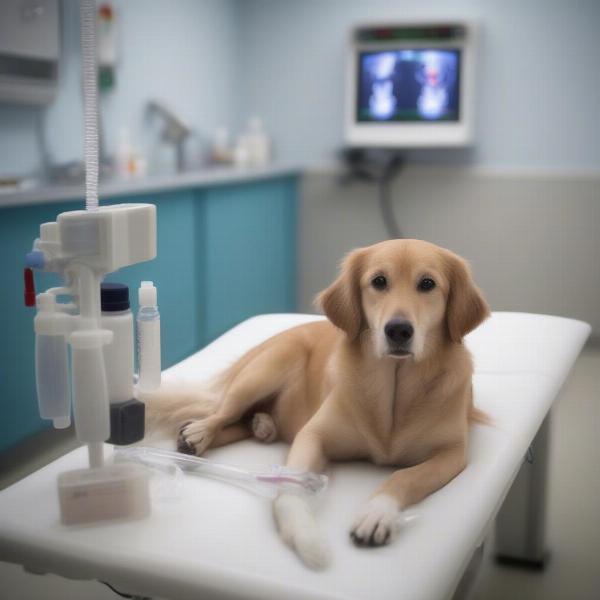High alkaline phosphatase (ALP) levels in dogs can be a cause for concern, but understanding what this enzyme is and what elevated levels can indicate is crucial. This article will explore the reasons behind dog high alk phosphatase, the associated symptoms, diagnostic processes, and treatment options.
Alkaline phosphatase is an enzyme found throughout the body, with the liver being the primary source in dogs. While some elevation is normal, especially in puppies and older dogs, significantly high levels can signal underlying health problems. It’s important to note that ALP levels alone aren’t enough for a definitive diagnosis and further testing is always required.
What Causes High Alk Phosphatase in Dogs?
Several factors can contribute to dog high alk phosphatase, ranging from relatively benign conditions to more serious illnesses. Some of the most common causes include:
- Cushing’s Disease: This hormonal disorder is characterized by excessive cortisol production, often leading to increased ALP levels.
- Liver Disease: Conditions like hepatitis, cirrhosis, or tumors can significantly impact liver function and elevate ALP.
- Bone Disease: Certain bone diseases, such as hypertrophic osteodystrophy (HOD) in puppies, can increase ALP production.
- Certain Medications: Some medications, particularly steroids like prednisone, are known to induce elevated ALP.
- Kidney Disease: Although less common than liver disease, kidney problems can also sometimes cause a rise in ALP.
 Chó đang được điều trị alk phosphatase cao
Chó đang được điều trị alk phosphatase cao
Symptoms Associated with Elevated ALP in Dogs
High ALP in dogs doesn’t always manifest in noticeable symptoms. However, depending on the underlying cause, you might observe signs such as:
- Increased Thirst and Urination: Often seen in Cushing’s disease and kidney problems.
- Loss of Appetite and Weight Loss: Can be indicative of liver disease or other systemic illnesses.
- Vomiting and Diarrhea: Common symptoms associated with gastrointestinal issues, which can sometimes be related to liver or kidney dysfunction.
- Lethargy and Weakness: General signs of illness that can accompany many underlying conditions.
- Jaundice (Yellowing of Skin and Gums): A more specific sign of liver problems.
Diagnosing Dog High Alk Phosphatase
If your dog’s blood test reveals high alk phosphatase, your veterinarian will conduct a series of further investigations to pinpoint the cause. These may include:
- Additional Blood Tests: To assess liver and kidney function, including bile acids and other liver enzymes. high levels of alkaline phosphatase in dogs
- Urine Analysis: To evaluate kidney function and look for signs of infection.
- Imaging Tests (X-rays, Ultrasound): To visualize the liver, kidneys, and other internal organs for abnormalities.
- Biopsy: In some cases, a liver or bone biopsy may be necessary for a definitive diagnosis. alk phosphatase dog
Treatment for Elevated ALP in Dogs
Treatment for dog high alk phosphatase depends entirely on the underlying cause. Once a diagnosis is established, your veterinarian will recommend a specific treatment plan. This might involve:
- Medications: For conditions like Cushing’s disease, liver disease, or infections.
- Dietary Changes: A special diet might be prescribed to support liver or kidney function.
- Surgery: In cases of tumors or other surgical conditions.
Conclusion
Elevated ALP in dogs can be a sign of various underlying health issues. While it can be concerning, early diagnosis and appropriate treatment are crucial for managing the condition and improving your dog’s prognosis. If your dog shows any signs of illness or has abnormal blood test results, consult your veterinarian promptly. elevated alk phos in dogs
FAQ
- What is a normal ALP level in dogs? Normal ALP levels can vary depending on the laboratory, but are generally between 20-150 U/L.
- Is slightly elevated ALP always a cause for concern? Not necessarily. Puppies and older dogs can have slightly higher ALP levels.
- Can diet affect ALP levels in dogs? Yes, certain diets and nutritional deficiencies can influence ALP levels.
- How often should my dog have blood work done? Your veterinarian will recommend an appropriate schedule based on your dog’s age, breed, and health status.
- What should I do if my dog’s ALP is very high? Contact your veterinarian immediately for further evaluation and diagnostic testing. what is alkp in dog blood test
- Can stress affect ALP levels? While not a primary cause, stress can sometimes contribute to minor elevations in ALP.
- Is high ALP in dogs painful? The high ALP itself isn’t painful, but the underlying condition causing it might be.
ILM Dog is a leading international online resource dedicated to providing expert advice and guidance on dog care and wellbeing. We offer comprehensive information on various aspects of dog ownership, from breed selection and health care to training, nutrition, and grooming. We strive to empower dog owners worldwide with the knowledge and resources they need to provide the best possible care for their canine companions. For further assistance or inquiries, feel free to contact us via email at [email protected] or by phone at +44 20-3965-8624. ILM Dog is here to support you and your furry friend every step of the way.